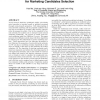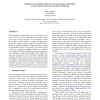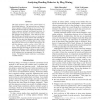PODC
2010
ACM
14 years 1 months ago
2010
ACM
The study of complex networks led to the belief that the connectivity of network nodes generally follows a Power-law distribution. In this work, we show that modeling large-scale ...
CIKM
2008
Springer
14 years 1 months ago
2008
Springer
Online communities are connecting hordes of individuals and generating rich social network data. The social capital that resides within these networks is largely unknown. We propo...
CIKM
2008
Springer
14 years 1 months ago
2008
Springer
As online social networking emerges, there has been increased interest to utilize the underlying social structure as well as the available social information to improve search. In...
CIKM
2008
Springer
14 years 1 months ago
2008
Springer
Social network systems on the Internet, such MySpace and LinkedIn, are growing in popularity around the world. The level of such activity is now comparable to that associated with...
CIKM
2008
Springer
14 years 1 months ago
2008
Springer
Social Network Marketing techniques employ pre-existing social networks to increase brands or products awareness through word-of-mouth promotion. Full understanding of social netw...
JCDL
2010
ACM
2010
ACM
Timeline interactive multimedia experience (time): on location access to aggregate event information
14 years 1 months ago
Attending a complex scheduled social event, such as a multi-day music festival, requires a significant amount of planning before and during its progression. Advancements in mobile...
BPM
2008
Springer
14 years 1 months ago
2008
Springer
Abstract. The aim of this paper is to show how the use of social networks may help users to behave as modelers they trust. Users are guided in this respect within the context of an...
WSC
2008
14 years 1 months ago
2008
Understanding how the structure of a network evolves over time is one of the most interesting and complex topics in the field of social networks. In our attempt to model the dynam...
AAAI
2008
14 years 1 months ago
2008
One of the core goals of the Semantic Web is to store data in distributed locations, and use ontologies and reasoning to aggregate it. Social networking is a large movement on the...
AAAI
2007
14 years 1 months ago
2007
This paper presents a study of the various aspects of blog reading behavior. The analyzed data are obtained from a Japanese weblog hosting service, Doblog. Four kinds of social ne...



